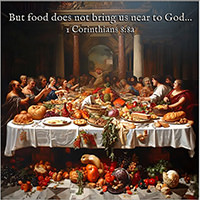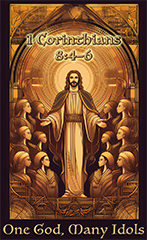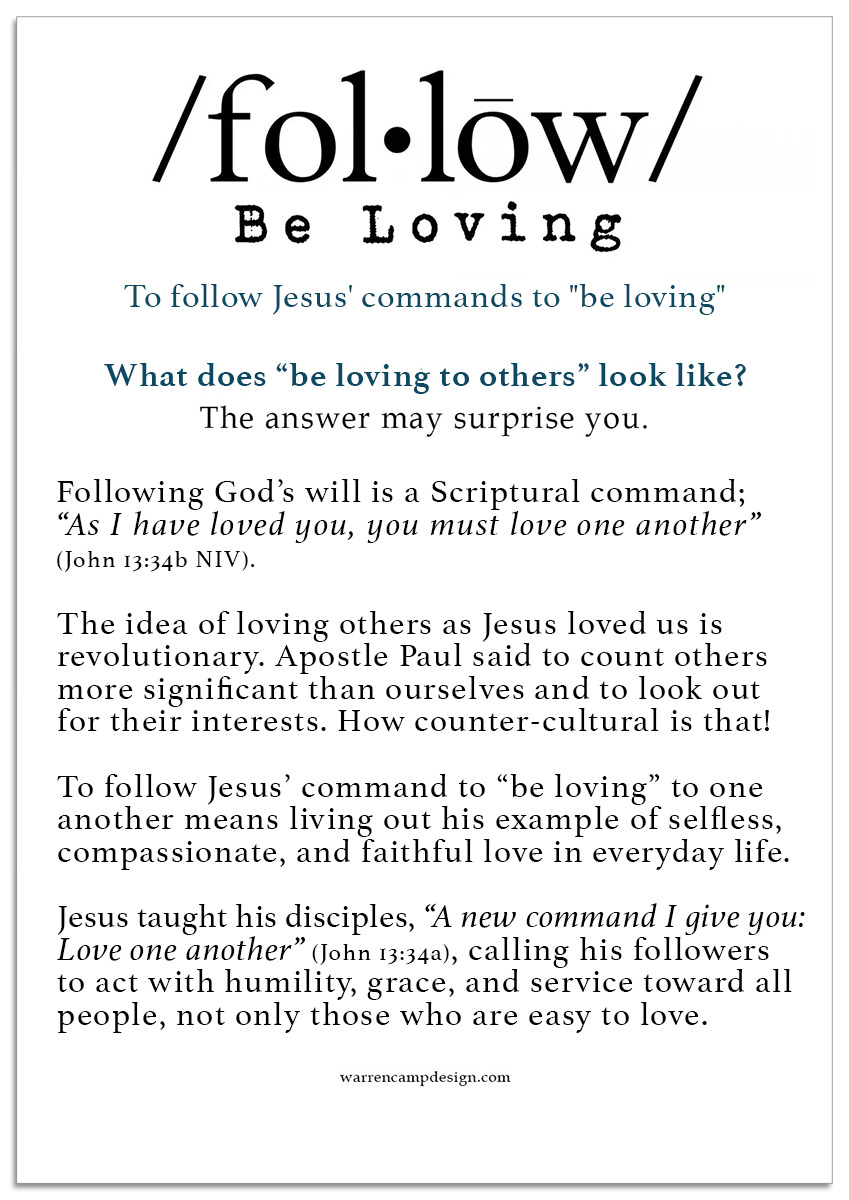First Corinthians 8:1–13 . . . Bible Study Summary with Questions
Food Sacrificed to Idols
In the Christian life, we’ve been given great freedom; yet there are certain potential danger spots that can cause a serious accident between brothers and sisters in Christ. In 1 Corinthians 8, we’ve a dangerous intersection concerning meat offered to idols. Paul knew that there was only one true God and that idols were nothing; eating meat offered to them was neither right nor wrong. But not all believers felt that way.
As Christians, we’re free in Christ — free to engage in social practices and customs not specifically forbidden by biblical commands. However, the Holy Spirit may prompt us to refrain from some legitimate practices. In the end, we have a responsibility to look out for our brother’s welfare. With this high calling in mind, Paul lays out two principles to guide us.
1. Recognize that love is more important than freedom (8:1–6, shown at the bottom of this page): Christians in Corinth questioned whether they should eat meat that had been offered to idols. For Paul, however, the more important question was how the church should deal with it. He answers that question by making this point: Corinthians who are boasting of their freedom to eat meat sacrificed to idols are acting arrogantly, without demonstrating love and respect for their brothers and sisters.
Right off the bat, Paul alerts us in 8:1b, in effect asking us, Are you ‘puffed up’ in your knowledge? Do you look down on others who don’t know as much as you do? Paul tells us to recognize that “love builds up.” Christian life isn’t based on how much we know, or how strong we are, or how much Christian liberty we might possess, but “how much we love others.” After all, you are your brother’s keeper (Genesis 4:9). Our Lord God tells us to follow his commandment: “Love your neighbor as yourself.”
In vv. 4–6, Paul staunchly argues against idols and puts forth a profound understanding of God. He reminds the Corinthians that there’s only one God worthy of worship — God the Father — and one Lord, Jesus Christ.
[The heart of Paul’s argument, especially as it relates to Christian community, comes in vv. 7–13. Even though members of the Corinthian church understand that idols have no real existence (v. 1), many are unable to put this knowledge into practice.]
2. Limit your freedom for the sake of love (vv. 7–13): Paul’s teaching in these seven verses consistently presses believers to limit their own freedoms for the spiritual good of others. He calls the church body to live as a cross-shaped community where love — not rights — sets the agenda. He challenges us to look out for our brothers and sisters because we love them and have their best spiritual interest at heart. In v. 8 (photo right), he addresses food sacrificed to idols and makes “love,” not “knowledge,” the controlling principle.
Paul does have a word of warning in v. 9: “Be careful, however, that the exercise of your rights does not become a stumbling block to the weak.” For example, believers who enjoy eating food at a Chinese restaurant ought to look for idols hung or displayed in the restaurant. While we recognize that those idols mean nothing to us, we ought to be careful when taking a new Christian who’d been saved from Buddhism or Hinduism to such a restaurant. See Paul’s similar illustration in v.10 below.
Paul concludes this chapter by using himself as an example. The point being: We need to remember that there’s something more important than our freedom to do as we please. What a Christlike attitude that is! He exhorts us by example: “Don’t look at your freedom; look at their need.”
Note: 1st Corinthians challenges believers to examine every aspect of their lives through the lens of the Gospel. In chapters 8–10, Paul presents these three challenges:
Food offered to idols (ch. 8) | Surrendering his rights (ch. 9) | Warning against idolatry (ch. 10)
› Watch BibleProject’s superb animated video (2 min.) highlighting Paul’s messages in these three chapters.
† Summary of 1 Corinthians 8:1–13
As a Christian e-minister and Bible study teacher, I’m pleased to provide a summary of 1 Corinthians 8:1–13 for you. This passage addresses an important issue in the early church regarding food sacrificed to idols and how Christians should navigate this complex cultural situation. Here are its key points:
• Knowledge and Love (vv. 1–3)
This opening three-verse passage sets the tone for the entire chapter. It introduces a crucial principle that Paul elaborates on throughout the letter. As he introduces the topic of food sacrificed to idols, he acknowledges a common claim: “We all possess knowledge.” He then contrasts knowledge with love, stating that knowledge can lead to pride, while love edifies others.
1) Paul begins by contrasting knowledge with love.
2) He warns that knowledge can lead to pride, while love builds up.
3) True knowledge of God is demonstrated through love for him.
Paul cautions against overconfidence in one’s knowledge. He suggests that those who believe they have full understanding may actually lack true wisdom (v. 2). He shifts the focus in v. 3 from human knowledge to a relationship with God, emphasizing that being known by God, which comes through loving him, is more important than possessing knowledge.
• One God, Many Idols (vv. 4–6)
This next passage is crucial in understanding the Christian perspective on idols and the nature of God. In v. 4, Paul addresses the specific issue of eating food sacrificed to idols. In v. 5, he acknowledges the existence of many so-called gods and lords in the world. And in v. 6, he presents a clear Christian monotheistic statement.
1) Paul affirms the monotheistic belief: There’s only one true God.
2) He acknowledges the existence of many so-called gods and idols in the world.
3) He emphasizes that for Christians, there’s one Father God and one Lord Jesus Christ.
• Freedom and Responsibility (vv. 7–13)
This closing paragraph deals with the practical application of Christian freedom and responsibility.
1) Not all believers have the same level of understanding about idols.
2) Some may still feel guilty about eating food sacrificed to idols.
3) Paul warns against using Christian freedom in a way that causes others to stumble.
4) So he stresses the importance of considering the impact of our actions on fellow believers.
This thirteen-verse passage beautifully exemplifies the principle (from v. 1) of love building up in action. It challenges us to consider how our choices and actions impact others, even when we have freedom to do things.
Application for today’s Christian While we may not face the same exact issue of food sacrificed to idols, this passage teaches us important principles. We’re to: (1) prioritize love over knowledge; (2) consider the impact of our action; (3) be willing to limit our freedom; and (4) strive to unite in the body of Christ.
In our current context, this principle can apply to various areas where Christians might differ in conviction or conscience, such as entertainment choices, observance of certain holidays, or engagement with secular culture. Paul’s encompassing message, then and today, is to prioritize the spiritual growth and well-being of fellow believers over one’s personal freedoms.
- Q. 1 When have you used your knowledge to build up fellow Christians (v. 1)? What was the response? Do you strive to balance your head knowledge with Christlike love?
- Q. 2 Seeing how important theology is to Paul (vv. 4–6), should theology be important to you, too? If so, to what degree?
- Q. 3 What sin are you presently struggling with that might “destroy” a brother (v. 11)? How can you learn to be more sensitive to fellow Christians?
1 Corinthians 8:1–13
New International Version (NIV)
[You can view it in a different version by clicking here; you can also listen to this chapter.]
Concerning Food Sacrificed to Idols
8 1Now about food sacrificed to idols: We know that "We all possess knowledge." But knowledge puffs up while love builds up. 2Those who think they know something do not yet know as they ought to know. 3But whoever loves God is known by God.
4So then, about eating food sacrificed to idols: We know that "An idol is nothing at all in the world" and that "There is no God but one." 5For even if there are so-called gods, whether in heaven or on earth (as indeed there are many "gods" and many "lords"), 6yet for us there is but one God, the Father, from whom all things came and for whom we live; and there is but one Lord, Jesus Christ, through whom all things came and through whom we live.
7But not everyone possesses this knowledge. Some people are still so accustomed to idols that when they eat sacrificial food they think of it as having been sacrificed to a god, and since their conscience is weak, it is defiled. 8But food does not bring us near to God; we are no worse if we do not eat, and no better if we do.
9Be careful, however, that the exercise of your rights does not become a stumbling block to the weak. 10For if someone with a weak conscience sees you, with all your knowledge, eating in an idol’s temple, won’t that person be emboldened to eat what is sacrificed to idols? 11So this weak brother or sister, for whom Christ died, is destroyed by your knowledge. 12When you sin against them in this way and wound their weak conscience, you sin against Christ. 13Therefore, if what I eat causes my brother or sister to fall into sin, I will never eat meat again, so that I will not cause them to fall.




